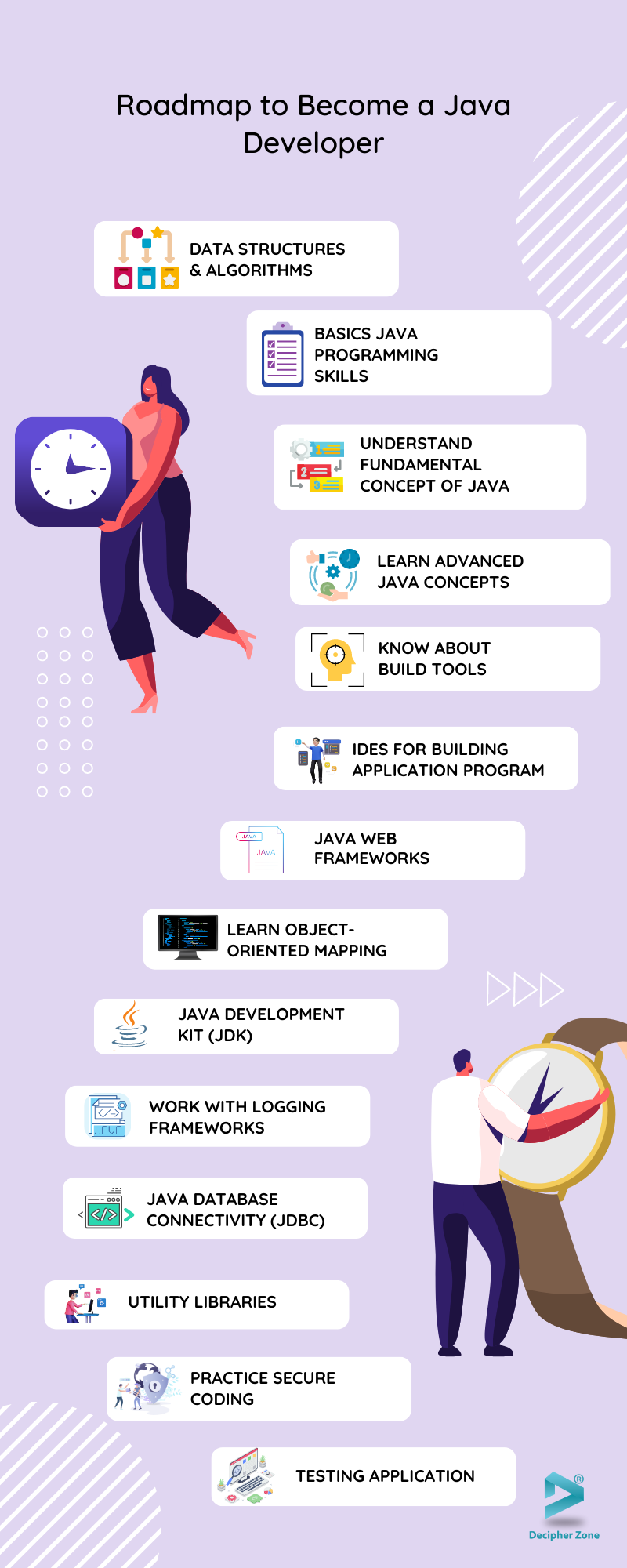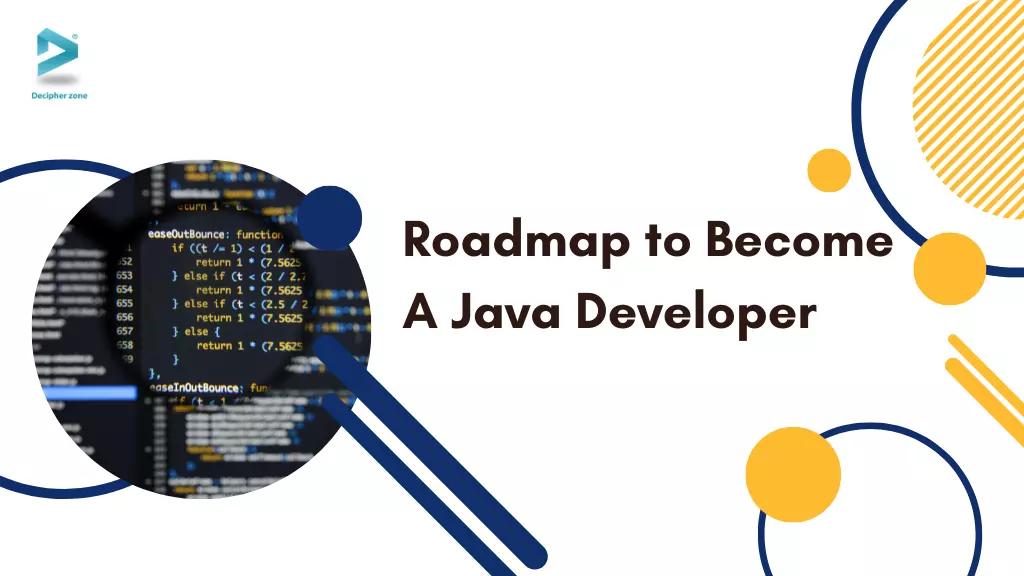Roadmap for Java developers in 2024. Java is among the top programming languages in the software industry. Over 9 million software developers have chosen Java for their projects.
Read: Front-end Developer Roadmap
With the continuous updates and increasing demand for Java over the years, it’s more likely for a new graduate to think of being a Java Developer. And that’s absolutely normal.
Read: DevOps Engineer Roadmap
But do you know what the Java Developer position entails and what benefits you can gain by learning Java?
Read: Software Architect Roadmap
This blog will help you set the right path to becoming a Java Developer. So, without further ado, let’s get started!
Who is a Java Developer?
A Java Developer is a specialized programmer responsible for performing tasks throughout the website, application, or software development lifecycle. The responsibilities of Java developers are as follows:
-
Designing, implementing, developing, and maintaining Java applications
-
Getting involved in architectural and software development activities
-
Executing software coding, testing, analysis, and debugging
-
Developing technical designs and documentation for web app development
-
Converting requirements into prerequisites.
-
Suggesting changes and modifications for improving the Java web app processes.
Benefits of Learning Java
Now that we are well aware of the responsibilities of a Java developer, it’s time to look at the benefits Java entails.
-
Tons of Resources to Learn From
One of the major reasons behind the popularity of Java is the availability of numerous resources such as documentation, reference architectures, step-by-step videos, tutorial, training, certifications, etc. makes it easier to learn Java.
-
Easy to Use
If you have learned languages like C and C++ then learning and using Java is going to be easier for you. Java syntax is based on C++. However, unlike C and C++, Java uses garbage collection to remove unreferenced objects.
Read: Structural Design Patterns in Java
To make it easier to work with Java, features like operator overloading, explicit pointers, etc. have also been removed.
-
Object-Oriented
Being object-oriented, everything in Java is associated with objects and classes. OOP makes Java faster to execute; makes code easier to maintain, modify, and debug; offers a clear program structure; and helps in making a reusable application. Moreover, with OOP, Java becomes an extensible, system-modular, and flexible language.
-
Robust
Java comes with strong memory management and allows developers to handle exceptions, and use type-checking to make the code highly secured. Moreover, to avoid unwanted access in the memory, Java doesn’t provide explicit pointers as well.
-
Multi-Threaded
Java can run multiple threads simultaneously. Multithreading is the program execution model allowing multi-threads to be created under the same process. While these threads will share the process resources they will run independently.
-
Platform Independent
Java intends to let programmers write once, and run anywhere (WORA). So, when we say Java is platform-independent, we refer to the fact that Java is independent of its byte code. When writing code in Java, it gets converted into Byte Code that can run on any operating system that supports Java without recompiling the code.
-
Rich API System
Java comes with a wide variety of APIs supported by the open-source ecosystem of Java. These APIs help in streamlining operating procedures and creating powerful web applications.
-
Great Community Support
With the continuously growing community of Java and over 9 million Java developers around the world, new developers get great support from experienced Java programmers through open forum platforms like StackOverflow.
Roadmap to Become a Java Developer in 2024
2024 Roadmap for Java developers. We have covered the basics that you needed to know before getting started with the Java Developer Roadmap. Now it’s time to help you set the path for you to be a Java Developer.
Read: Blockchain Developer Roadmap
-
Learn Data Structures and Algorithms
Data structures and algorithms are the building blocks of any program that helps in storing data to be used efficiently. To become a Java developer, learning data structures like linked lists, arrays, hash tables, queues, stacks, binary trees, and graphs along with algorithms such as Sorting, Shuffling, Data Manipulation, binary search, Composition, etc. are a must.
-
Gain General Programming Skills
If you are looking to pursue a career in programming, it’s important to have skills like problem-solving, computer science fundamentals, HTTP/HTTPS protocol, design patterns, test and domain-driven development, and networking basics.

-
Understand the Fundamentals
Before getting a proficient Java programmer, its fundamental concepts including but not limited to basic syntax, conditionals, data variables, data types, loops, data structures, packages, OOP (classes, objects, and interfaces), exceptional handling, and working with files and APIs must be clear to you.
-
Learn Advanced Concepts of Java
After getting a better understanding of the basic concepts, you need to go a bit deeper and learn about working with JVM, memory management, collection frameworks, generics, streams, threads, garbage collection, serialization, and networking & sockets.
-
Know About Build Tools
A build tool is used to automate the processes of assembling, compiling, and deploying software. Using build tools, a developer can also handle dependencies, package management, and continuous integration. Some of the build tools that you can learn about are Maven, Ant, and Gradle.
-
IDEs for Building Applications
Integrated Development Environments (IDEs) are software that allows developers to build applications using common developer tools into a GUI. An IDE consists of local build automation tools, a source code editor, plugins, extensions, and a debugger.
IntelliJ IDEA, NetBeans IDE, Eclipse, VS Code, etc are a few examples of IDEs among which you can choose one and learn to work with.
-
Web Frameworks for Java
Frameworks are the foundation/abstraction on which you can build your software applications without starting from scratch. Frameworks enhance both speed and quality of software development.
Spring, Spring Boot, Spark, Play, Hibernate, Struts, and Vaddin are some of the frameworks that are used for developing Java applications.
-
Learn Object-Relational Mapping (ORM)
ORM is a technique in programming that is used to convert data between the heap and relational databases of an object-oriented programming language like Java. It allows developers to manipulate and query a database. Some of the ORM tools for Java that you can learn about are TopLink, Hibernate, OpenJPA, EBean, and MyBatis.
-
Know How to Work with Java Development Kit (JDK)
Java Development Kit is among the core technology packages for Java besides JRE and JVM. JDK is a software development package that provides the necessary tools and libraries for writing Java programs that can be run by the JVM and JRE.
JDK includes an interpreter, Java Runtime Environment, a compiler, a document generator, a jar, etc.
You cannot work in Java without using JDK. Oracle JDK, Azul Systems Zing, IBM J9 JDK, OpenJDK, and Amazon Corretto are some of the popular JDK choices for Java developers.
-
Work with Logging Frameworks
To trace any error in the application, logging plays a crucial role. With logging frameworks, you get the ability to capture log files to record critical failures in the application. Log4J and Logback are two logging frameworks for Java that you can use.
-
Understand Java Database Connectivity (JDBC)
Java Database Connectivity is an API (application programming interface) that defines how a client can access a database to execute a query. And as a Java developer, it is essential to work with JDBC to create secure database access for the client.
-
Know About Utility Libraries
The power of Java lies in its environment of open-source libraries to do almost anything be it sending HTTP requests, logging into ML, or parsing JSON. Apache Commons, Guava, Logback, Jackson, GSON, JUnit, Apache Mina, and Eclipse Collection are a few Utility libraries that you must know about.
-
Practice Secure Coding
Making an application resilient to threats by identifying security vulnerabilities and fixing them is crucial to keep it safe from cyber attacks.
To make your Java web app secure, you can use code analysis tools (PMD, SonarQube, FindBugs, etc.), follow OWASP security guidelines, and add authentication through OAuth, JWT, LDAP, and SAML.
-
Don’t Forget to Test the Application
A key to ensuring the application being developed meets the requirements of the client without compromising its speed and performance is testing. Running continuous tests with the development can help in creating high-performing and lower-regression code. Cucumber-JVM, Mockito, and JBehave are a few tools you can use to test the application.
Takeaway
That’s all about the Java Developer Roadmap. We hope you find the article resourceful to build your career in Java. While we tried to cover different aspects of Java programming, some areas have been still left untouched.
So we encourage you to broaden your learning and practice every day not only with the tools and technologies mentioned here but also the ones that are about to emerge soon.
Besides, if you are a business owner looking to hire experienced Java Developers then get in touch with us now and get your customized quote!


.png)